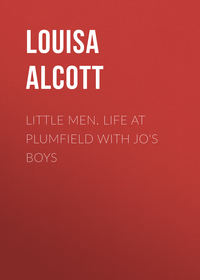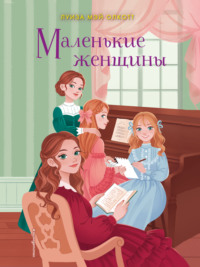 полная версия
полная версияLulu's Library. Volume 3 of 3
Lizzie could not understand it, and was content to sit and listen wherever she was placed, while her little fingers fumbled at the new objects near her, and her hungry mind opened like a flower to the sun. She had no tasks that day, and in the afternoon was led away with a flock of children, all chattering like magpies, on the grand expedition. Every year, when the fields were white with daisies, these poor little souls were let loose among them to enjoy the holy day of this child's flower. Ah, but was n't it a pretty sight to see the meeting between them, when the meadows were reached, and the children scattered far and wide with cries of joy as they ran and rolled in the white sea, or filled their eager hands, or softly felt for the dear daisies and kissed them like old friends? The flowers seemed to enjoy it too, as they danced and nodded, while the wind rippled the long grass like waves of a green sea, and the sun smiled as if he said, -
"Here's the sort of thing I like to see. Why don't I find more of it?"
Miss Grace was watching over her, but left her alone, and by and by, like a lark from its nest in the grass, the blind girl sent up her little voice, singing so sweetly that the children gathered around to hear, while they made chains and tied up their nosegays.
This was Lizzie's first concert, and no little prima donna was ever more pelted with flowers than she; for when she had sung all her songs, new and old, a daisy crown was put upon her head, a tall flower for a sceptre in her hand, and all the boys and girls danced around her as if she had been Queen of the May.
A little feast came out of the baskets, that they might be empty for the harvest to be carried home, and while they ate, stories were told and shouts of laughter filled the air, for all were as merry as if there was no darkness, pain, or want in the world. Then they had games; and Lizzie was taught to play, – for till now she never knew what a good romp meant. Her cheeks grew rosy, her sad little face waked up, she ran and tumbled with the rest, and actually screamed, to Minna's great delight.
Two or three of the children could see a little, and these were very helpful in taking care of the little ones. Miss Grace found them playing some game with Lizzie, and observed that all but she were blindfolded. When she asked why, one whispered, "We thought we should play fairer if we were all alike." And another added, "It seems somehow as if we were proud if we see better than the rest."
Lizzie was much touched by this sweet spirit, and a little later showed that she had already learned one lesson in the school, when she gathered about her some who had never seen, and told them what she could remember of green fields and daisy-balls before the light went out forever.
"Surely my little lark was worth saving, if only for this one happy day," thought Miss Grace, as she watched the awakened look in the blind faces, all leaning toward the speaker, whose childish story pleased them well.
In all her long and useful life, Lizzie never forgot that Daisy Day, for it seemed as if she were born anew, and like a butterfly had left the dark chrysalis all behind her then. It was the first page of the beautiful book just opening before the eyes of her little mind, – a lovely page, illustrated with flowers, kind faces, sunshine, and happy hopes. The new life was so full, so free, she soon fell into her place and enjoyed it all. People worked there so heartily, so helpfully, it was no wonder things went as if by magic, and the poor little creatures who came in so afflicted went out in some years independent people, ready to help themselves and often to benefit others.
There is no need to tell all Lizzie learned and enjoyed that summer, nor how proud her mother was when she heard her read in the curious books, making eyes of the little fingers that felt their way along so fast; when she saw the neat stitches she set, the pretty clay things she modelled, the tidy way she washed dishes, swept, and dusted, and helped keep her room in order. But the poor woman's heart was too full for words when she heard the child sing, – not as before, in the dreary room, sad, soft lullabies to Billy, but beautiful, gay songs, with flutes and violins to lift and carry the little voice along on waves of music.
Lizzie really had a great gift; but she was never happier than when they all sang together, or when she sat quietly listening to the band as they practised for the autumn concert. She was to have a part in it; and the thought that she could help to earn money for the Kindergarten made the shy child bold and glad to do her part. Many people knew her now, for she was very pretty, with the healthful roses in her cheeks, curly yellow hair, and great blue eyes that seemed to see. Her mates and teachers were proud of her, for though she was not as quick as some of the pupils, her sweet temper, grateful heart, and friendly little ways made her very dear to all, aside from the musical talent she possessed.
Every one was busy over the fair and the concert; and fingers flew, tongues chattered, feet trotted, and hearts beat fast with hope and fear as the time drew near, for all were eager to secure a home for the poor children still waiting in darkness. It was a charity which appealed to all hearts when it was known; but in this busy world of ours, people have so many cares of their own that they are apt to forget the wants of others unless something brings these needs very clearly before their eyes. Much money was needed, and many ways had been tried to add to the growing fund, that all might be well done.
"We wish to interest children in this charity for children, so that they may gladly give a part of their abundance to these poor little souls who have nothing. I think Lizzie will sing some of the pennies out of their pockets, which would otherwise go for bonbons. Let us try; so make her neat and pretty, and we 'll have a special song for her."
Mr. Constantine said this; and Miss Grace carried out his wish so well that when the time came, the little prima donna did her part better even than they had hoped.
The sun shone splendidly on the opening day of the fair, and cars and carriages came rolling out from the city, full of friendly people with plump purses and the sympathetic interest we all take in such things when we take time to see, admire, and reproach ourselves that we do so little for them.
There were many children; and when they had bought the pretty handiwork of the blind needle-women, eaten cake and ices, wondered at the strange maps and books, twirled the big globe in the hall, and tried to understand how so many blind people could be so busy and so happy, they all were seated at last to hear the music, full of expectation, for "the pretty little girl was going to sing."
It was a charming concert, and every one enjoyed it, though many eyes grew dim as they wandered from the tall youths blowing the horns so sweetly to the small ones chirping away like so many sparrows, for the blind faces made the sight pathetic, and such music touched the hearts as no other music can.
"Now she's coming!" whispered the eager children, as a little girl climbed up the steps and stood before them, waiting to begin.
A slender little creature in a blue gown, with sunshine falling on her pretty hair, a pleading look in the soft eyes that had no sign of blindness but their steadfastness, and a smile on the lips that trembled at first, for Lizzie's heart beat fast, and only the thought, "I 'm helping the poor little ones," gave her courage for her task.
But when the flutes and violins began to play like a whispering wind, she forgot the crowd before her, and lifting up her face, sang in clear sweet tones.
THE BLIND LARK'S SONGWe are sitting in the shadowOf a long and lonely night,Waiting till some gentle angelComes to lead us to the light;For we know there is a magicThat can give eyes to the blind.Oh, well-filled hands, be generous!Oh, pitying hearts, be kind!Help stumbling feet that wanderTo find the upward way;Teach hands that now lie idleThe joys of work and play.Let pity, love, and patienceOur tender teachers be,That though the eyes be blinded,The little souls may see.Your world is large and beautiful,Our prison dim and small;We stand and wait, imploring,"Is there not room for all?Give us our children's garden,Where we may safely bloom,Forgetting in God's sunshineOur lot of grief and gloom."A little voice comes singing;Oh, listen to its song!A little child is pleadingFor those who suffer wrong.Grant them the patient magicThat gives eyes to the blind!Oh, well-filled hands, be generous!Oh, pitying hearts, be kind!It was a very simple little song, but it proved wonderfully effective, for Lizzie was so carried away by her own feeling that as she sang the last lines she stretched out her hands imploringly, and two great tears rolled down her cheeks. For a minute many hands were too busy fumbling for handkerchiefs to clap, but the children were quick to answer that gesture and those tears; and one impetuous little lad tossed a small purse containing his last ten cents at Lizzie's feet, the first contribution won by her innocent appeal. Then there was great applause, and many of the flowers just bought were thrown to the little lark, who was obliged to come back and sing again and again, smiling brightly as she dropped pretty courtesies, and sang song after song with all the added sweetness of a grateful heart.
Hidden behind the organ, Miss Grace and Mr. Constantine shook hands joyfully, for this was the sort of interest they wanted, and they knew that while the children clapped and threw flowers, the wet-eyed mothers were thinking self-reproachfully, "I must help this lovely charity," and the stout old gentlemen who pounded with their canes were resolving to go home and write some generous checks, which would be money invested in God's savings-bank.
It was a very happy time for all, and made strangers friends in the sweet way which teaches heart to speak to heart. When the concert was over, Lizzie felt many hands press hers and leave something there, many childish lips kiss her own, with promises to "help about the Kindergarten," and her ears were full of kind voices thanking and praising her for doing her part so well. Still later, when all were gone, she proudly put the rolls of bills into Mr. Constantine's hand, and throwing her arms about Miss Grace's neck, said, trembling with earnestness, "I 'm not a burden any more, and I can truly help! How can I ever thank you both for making me so happy?"
One can fancy what their answer was and how Lizzie helped; for long after the Kindergarten was filled with pale little flowers blooming slowly as she had done, the Blind Lark went on singing pennies out of pockets, and sweetly reminding people not to forget this noble charity.
V
MUSIC AND MACARONI
Among the pretty villages that lie along the wonderful Cornice road which runs from Nice to Genoa, none was more beautiful than Valrose. It deserved its name, for it was indeed a "valley of roses." The little town with its old church nestled among the olive and orange trees that clothed the hillside, sloping up to purple mountains towering behind. Lower down stretched the vineyards; and the valley was a bed of flowers all the year round. There were acres of violets, verbenas, mignonette, and every sweet-scented blossom that grows, while hedges of roses, and alleys of lemon-trees with their white stars made the air heavy with perfume. Across the plain, one saw the blue sea rolling to meet the bluer sky, sending fresh airs and soft rains to keep Valrose green and beautiful even through the summer heat. Only one ugly thing marred the lovely landscape, and that was the factory, with its tall chimneys, its red walls, and ceaseless bustle. But old ilex-trees tried to conceal its ugliness; the smoke curled gracefully from its chimney-tops; and the brown men talked in their musical language as they ran about the busy courtyard, or did strange things below in the still-room. Handsome black-eyed girls sang at the open windows at their pretty work, and delicious odors filled the place; for here the flowers that bloomed outside were changed to all kinds of delicate perfumes to scent the hair of great ladies and the handkerchiefs of dainty gentlemen all the world over.
The poor roses, violets, mignonette, orange-flowers, and their sisters, were brought here in great baskets to yield up their sweet souls in hot rooms where, fires burned and great vats boiled; then they were sent up to be imprisoned in pretty flasks of all imaginable shapes and colors by the girls, who put gilded labels on them, packed them in delicate boxes, and sent them away to comfort the sick, please the rich, and put money in the pockets of the merchants.
Many children were employed in the light work of weeding beds, gathering flowers, and running errands; among these none were busier, happier, or more beloved than Florentino and his sister Stella. They were orphans, but they lived with old Mariuccia in her little stone house near the church, contented with the small wages they earned, though their clothes were poor, their food salad, macaroni, rye bread, and thin wine, with now and then a taste of meat when Stella's lover or some richer friend gave them a treat on gala days.
They worked hard, and had their dreams of what they would do when they had saved up a little store; Stella would marry her Beppo and settle in a home of her own; but Tino was more ambitious, for he possessed a sweet boyish voice and sang so well in the choir, at the merrymakings, and about his work, that he was called the "little nightingale," and much praised and petted, not only by his mates, but by the good priest who taught him music, and the travellers who often came to the factory and were not allowed to go till Tino had sung to them.
All this made the lad vain; and he hoped one day to go away as Baptista had gone, who now sang in a fine church at Genoa and sent home gold napoleons to his old parents. How this was to come about Tino had not the least idea, but he cheered his work with all manner of wild plans, and sang his best at Mass, hoping some stranger would hear, and take him away as Signor Pulci had taken big Tista, whose voice was not half so wonderful as his own, all had said. No one came, however, and Tino at thirteen was still at work in the valley, – a happy little lad, singing all day long as he carried his fragrant loads to and fro, ate his dinner of bread and beans fried in oil, with a crust, under the ilex-trees, and slept like a dormouse at night on his clean straw in the loft at Mariuccia's, with the moon for his candle and the summer warmth for his coverlet.
One day in September, as he stood winnowing mignonette seed in a quiet corner of the vast garden, he was thinking deeply over his hopes and plans, and practising the last chant Father Angelo had taught him, while he shook and held the sieve high, to let the wind blow away the dead husks, leaving the brown seeds behind.
Suddenly, as he ended his lesson with a clear high note that seemed to rise and die softly away like the voice of an angel in the air, the sound of applause startled him; and turning, he saw a gentleman sitting on the rude bench behind him, – a well-dressed, handsome, smiling gentleman, who clapped his white hands and nodded and said gayly, "Bravo, my boy, that was well done! You have a wonderful voice; sing again."
But Tino was too abashed for the moment, and could only stand and stare at the stranger, a pretty picture of boyish confusion, pleasure, and shyness.
"Come, tell me all about it, my friend. Who taught you so well? Why are you here, and not where you should be, learning to use this fine pipe of yours, and make fame and money by it?" said the gentleman, still smiling as he leaned easily in his seat and swung his gloves.
Tino's heart began to beat fast as he thought, "Perhaps my chance has come at last! I must make the most of it." So taking courage, he told his little story; and when he ended, the stranger gave a nod, saying, -
"Yes, you are the 'little nightingale' they spoke of up at the inn. I came to find you. Now sing me something gay, some of your folk-songs. That sort will suit you best."
Anxious to make the most of his chance, Tino took courage and sang away as easily as a bird on a bough, pouring out one after another the barcaroles, serenades, ballads, and drinking-songs he had learned from the people about him.
The gentleman listened, laughed, and applauded as if well pleased, and when Tino stopped to take breath, he gave another nod more decided than the first, and said with his engaging smile, -
"You are indeed a wonder, and quite wasted here. If I had you I should make a man of you, and put money in your pocket as fast as you opened your mouth."
Tino's eyes sparkled at the word "money," for sweet as was the praise, the idea of having full pockets bewitched him, and he asked eagerly, "How, signor?"
"Well," answered the gentleman, idly tapping his nose with a rose-bud which he had pulled as he came along, "I should take you to my hotel at Nice; wash, brush, and trim you up a little; put you into a velvet suit with a lace collar, silk stockings, and buckled shoes; teach you music, feed you well, and when I thought you fit carry you with me to the salons of the great people, where I give concerts. There you would sing these gay songs of yours, and be petted, praised, and pelted with bonbons, francs, and kisses perhaps, – for you are a pretty lad and these fine ladies and idle gentlemen are always ready to welcome a new favorite. Would you fancy that sort of life better than this? You can have it if you like."
Tino's black eyes shone; the color deepened in his brown cheeks; and he showed all his white teeth as he laughed and exclaimed with a gesture of delight, -
"Mio Dio! but I would, signor! I 'm tired of this work; I long to sing, to see the world, to be my own master, and let Stella and the old woman know that I am big enough to have my own way. Do you really mean it? When can I go? I'm ready now, only I had better run and put on my holiday suit and get my guitar."
"Good! there 's a lad of spirit. I like that well. A guitar too? Bravo, my little troubadour, we shall make a sensation in the drawing-rooms, and fill our pockets shortly. But there is no haste, and it would be well to ask these friends of yours, or there might be trouble. I don't steal nightingales, I buy them; and I will give the old woman, whoever she may be, more than you would earn in a month. See, I too am a singer, and this I made at Genoa in a week." As he spoke, Signor Mario pulled a well-filled purse from one pocket, a handful of gold and silver coin from the other, and chinked them before the boy's admiring eyes.
"Let us go!" cried Tino, flinging down the sieve as if done with work forever. "Stella is at home to-day; come at once to Mariuccia, – it is not far; and when they hear these fine plans, they will be glad to let me go, I am sure."
Away he went across the field of flowers, through the courtyard, up the steep street, straight into the kitchen where his pretty sister sat eating artichokes and bread while the old woman twirled her distaff in the sun. Both were used to strangers, for the cottage was a picturesque place, half hidden like a bird's nest in vines and fig-trees, with a gay little plot of flowers before it; travellers often came to taste Mariuccia's honey, for her bees fared well, and their combs were running over with the sweetness of violets and roses, put up in dainty little waxen boxes made by better workmen than any found at the factory.
The two women listened respectfully while Signor Mario told his plan in his delightfully gracious way; and Stella was much impressed by the splendor of the prospect before her brother. But the wise old woman shook her head, and declared decidedly that the boy was too young to leave home yet. Father Angelo was teaching him well; he was safe and happy where he was; and there he should remain, for she had sworn by all the saints to his dying mother that she would guard him as the apple of her eye till he was old enough to take care of himself.
In vain Mario shook his purse before her eyes, Stella pleaded, and Tino stormed; the faithful old soul would not give up, much as she needed money, loved Stella, and hated to cross the boy who was in truth "the apple of her eye" and the darling of her heart. There was a lively scene in the little room, for every one talked at once, gesticulated wildly, and grew much excited in the discussion; but nothing came of it, and Signor Mario departed wrathfully, leaving Mariuccia looking as stern as fate with her distaff, Stella in tears, and Tino in such a rage he could only dash up to the loft and throw himself on his rude bed, there to kick and sob and tear his hair, and wish there might be ten thousand earthquakes to swallow that cruel old woman up in the twinkling of an eye.
Stella came to beg him to be comforted and eat his supper, but he drew the wooden bolt and would not let her in, saying sternly, -
"I never will come down till Mariuccia says I may go; I will starve first. I am not a child to be so treated. Go away, and let me alone; I hate you both!"
Poor Stella retired, heart-broken, and when all her entreaties failed to change their guardian's decision, she went to consult Father Angelo. He agreed with the old woman that it was best to keep the boy safe at home, as they knew nothing of the strange gentleman nor what might befall Tino if he left the shelter of his own humble home and friends.
Much disappointed, Stella went to pray devoutly in the church, and then, meeting her Beppo, soon forgot all about the poor little lad who had sobbed himself to sleep upon his straw.
The house was quiet when he awoke; no lights shone from any neighbor's windows; and all was still except the nightingales singing in the valley. The moon was up; and her friendly face looked in at the little window so brightly that the boy felt comforted, and lay staring at the soft light while his mind worked busily. Some evil spirit, some naughty Puck bent on mischief must have been abroad that night, for into Tino's head there suddenly popped a splendid idea; at least he thought it so, and in his rebellious state found it all the more tempting because danger and disobedience and defiance all had a part in it.
Why not run away? Signor Mario was not to leave till next morning. Tino could easily slip out early and join the kind gentleman beyond the town. This would show the women that he, Tino, had a will of his own and was not to be treated like a child any more. It would give them a good fright, make a fine stir in the place, and add to his glory when he returned with plenty of money to display himself in the velvet suit and silk stockings, – a famous fellow who knew what he was about and did not mean to be insulted, or tied to an old woman's apron-string forever.
The longer he thought the more delightful the idea became, and he resolved to carry it out, for the fine tales he had heard made him more discontented than ever with his present simple, care-free life. Up he got, and by the light of the moon took from the old chest his best suit. Moving very softly, he put on the breeches and jacket of rough blue cloth, the coarse linen shirt, the red sash, and the sandals of russet leather that laced about his legs to the knee. A few clothes, with his rosary, he tied up in a handkerchief, and laid the little bundle ready with his Sunday hat, a broad-brimmed, pointed-crowned affair with a red band and cock's feather to adorn it.
Then he sat at the window waiting for dawn to come, fearing to sleep lest he be too late. It seemed an almost endless night, the first he had ever spent awake, but red streaks came in the east at last, and he stole to the door, meaning to creep noiselessly downstairs, take a good hunch of bread and a gourd full of wine and slip off while the women slept.
To his dismay he found the door barred on the outside. His courage had ebbed a little as the time for action came; but at this new insult he got angry again, and every dutiful impulse flew away in a minute.
"Ah, they think to keep me, do they? Behold, then, how I cheat the silly things! They have never seen me climb down the fig-tree, and thought me safe. Now I will vanish, and leave them to tear their hair and weep for me in vain."
Not till he reached the top of the long hill a mile away, did he slacken his lively pace; then climbing a bank, he lay down to rest under some olive-trees, and ate his grapes as he watched the sun rise. Travellers always left the Falcone Inn early to enjoy the morning freshness, so Tino knew that Signor Mario would soon appear; and when the horses paused to rest on the hill-top, the "little nightingale" would present himself as unexpectedly as if he had fallen from heaven.









